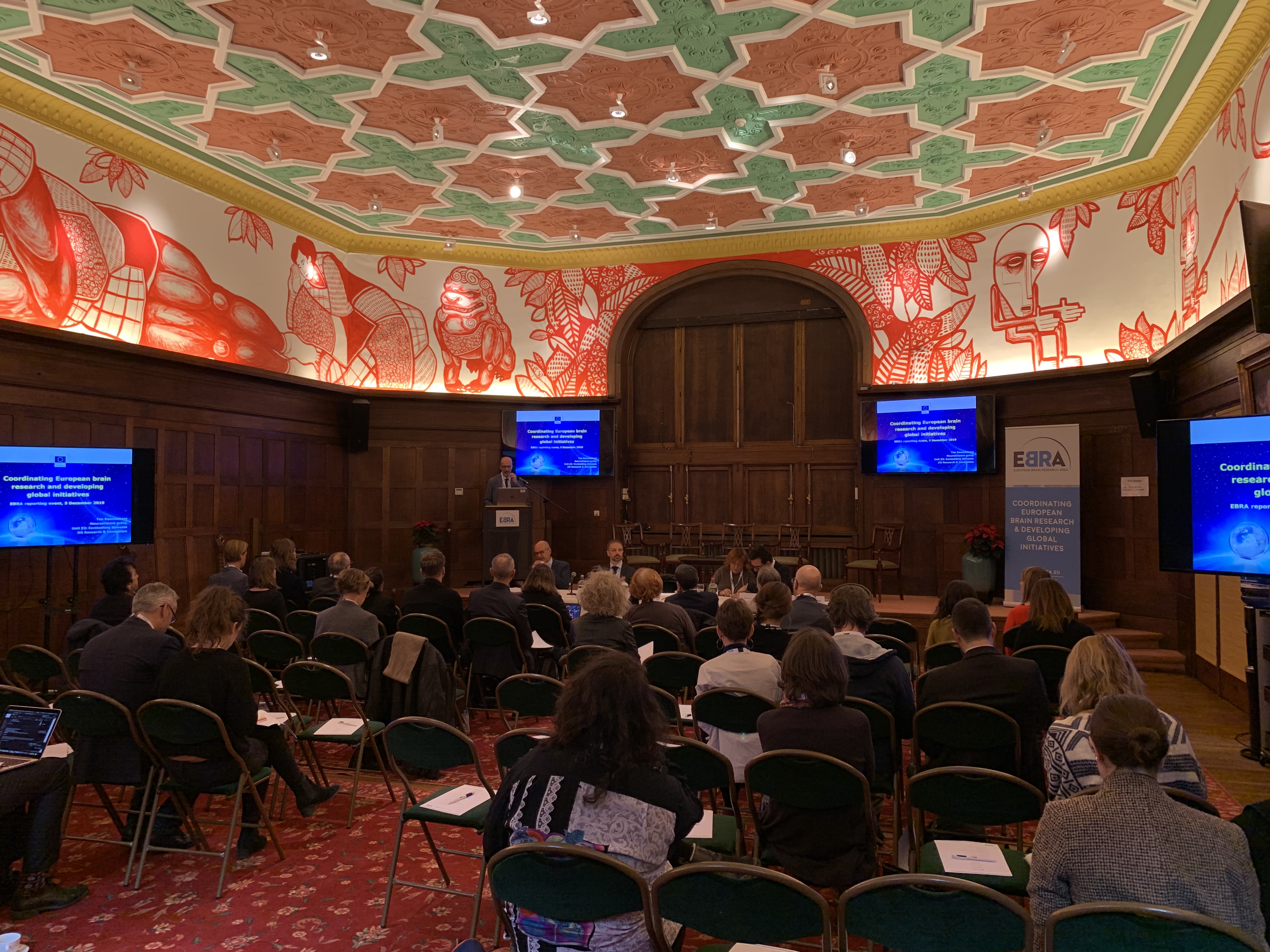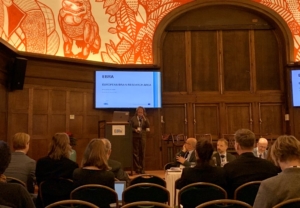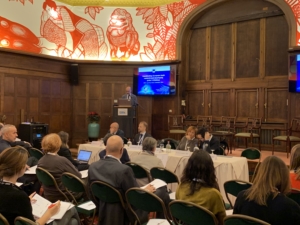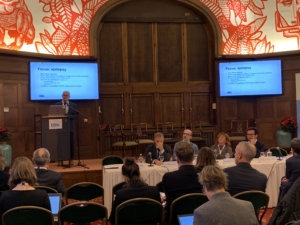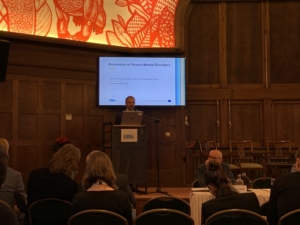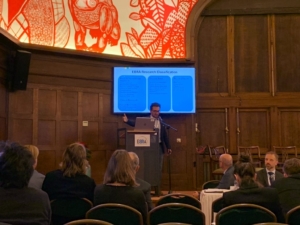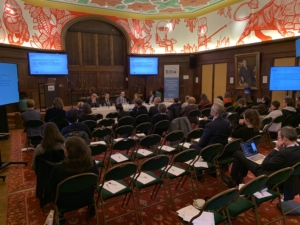On 5 December 2019, the EBRA consortium hosted its first public event of the project, where members of the general public were invited to hear presentations on the first two selected clusters, the brain research landscape analysis and the project as a whole.
The event began with a welcome and introduction from Project Officer, Dr Tim Raemaekers (DG Research & Innovation, European Commission) and EBC President, Prof Monica Di Luca. Dr. Tim Raemakers explained that EBRA is a response to the societal challenge “Health, demographic change and wellbeing” and that the topic is important because the EU & Member States have made considerable investments in brain research, with many large research initiatives established (e.g., EU Joint Programme – Neurodegenerative Disease Research, Human Brain Project, ERANET-NEURON, Innovative Medicines Initiative). Projects have generated considerable amounts of knowledge and innovative approaches, however, translation into new health interventions is below expectations and requirements, leading to a need for better networking, coordination of efforts at European and global level and minimization of fragmentation and duplication. Prof. Dr. Monica Di Luca then illustrated how EBRA is in the perfect position to address these needs. First, EBRA brings together the major brain initiatives: HBP, JPND, NEURON and EBC. EBC decided to endorse this project because it represents all major European organizations with an interest in the brain — merging scientific and clinical societies with patients organizations — also representing EU member States and relevant brain research stakeholders.
- EBC President, Prof. Monica Di Luca, welcomes the room and introduces the EBRA project
- Project Officer, Dr. Tim Raemaekers (European Commission) discusses the mindset behind the H2020 call and the need for a project like EBRA
The agenda then moved to the first set of presentations, from the selected clusters of the first round of calls for EBRA clusters.
EPI-Cluster was presented by Prof. Dr. Michele Simonato (University of Ferrara). It focuses on epilepsy (a neurological disease affecting 6 million people in Europe and costing 16 billion Euros/year). In order to optimise anti-epileptic drugs, to reduce co-morbidities, SUDEP, stigma and to increase access to drugs, more needs to be done at policy level and there is an urgent need of trans-disciplinary, coordinated actions. Further research and innovation efforts by the community of researchers, clinicians and industry are essential to reach tangible goals and ensure that these achievements reach persons with epilepsy. EPICluster aims to:
- Advance the existing collaboration by expanding the network
- Advance research on core topics.
- Enhance resource-sharing through the development of a preclinical trial network and researcher exchange mechanisms
- Increase engagement of persons with epilepsy and their representatives
- Develop a global funding initiative on epilepsy research across agencies
The Prevention of Severe Mental Disorders (PSMD) Cluster was presented by Prof. Dr. Paolo Fusar Poli (King’s College London and University of Pavia). It focuses on the Prevention of Severe Mental Disorders–SMDs have an overall lifetime prevalence of 12% in Europe and 264 million people live with depression, 45 million with bipolar disorders, 20 million with schizophrenia. This comes with an enormous cost for the healthcare system and intervening early to prevent the disease is highly needed. The PSMD cluster involves 2 ECNP clusters: 1. ECNP Prevention of Mental Disorders and Mental Health Promotion Network; 2. ECNP Bipolar Disorders Network. Together, they aim to:
- Cross-fertilise leading European institutions
- Harmonise assessment, outcome measures and interventions
- Implement digital health, big data and precision medicine into healthcare
- Promote clinical research partnerships
- Produce clinical guidelines
- Apply for European grant funding
- Disseminate preventive culture in psychiatry
- Engage policy makers, healthcare systems, patients and their families
- EPI-Cluster, presented by Prof. Dr. Michele Simonato (University of Ferrara)
- Prevention of Severe Mental Disorders (PSMD) Cluster, presented by Prof. Dr. Paolo Fusar Poli (King’s College London and University of Pavia)
Initial results of the Brain Research Landscape Analysis were then presented by Dr. Giovanni Esposito (EBC), which was performed over the last months and aims to provide an overview of the current landscape of the European brain research funded in the EU framework programmes and the funding initiatives of JPND, NEURON and Human Brain Project. These data will be further analysed in the upcoming months and written down in a report that will be made publicly available. This report will feed the SEBRA (= Shared European Brain Research Agenda).
- Brain Research Landscape Analysis, presented by Dr. Giovanni Esposito (EBC)
- Audience Discussion
Lastly, Prof. Dr. Ulrich Dirnagl (Charité-Universitätsmedizin Berlin) presented on “Quality assurance in preclinical research: Safeguarding quality of research in frame of the European Brain Research Area (EBRA) project”. Prof. Dr. Ulrich Dirnagl introduced QUEST (Quality | Ethics | Open Science | Translation), which strives to increase the value of biomedical research at the Berlin Institute of Health (i.e. Charité and Max Delbrück Center) and beyond. They focus on Quality assurance, Education & Training, Open Science, Meta Research, Incentives and rewards, Stakeholder Engagement, Translational Bioethics and Thinktank. Regarding pre-clinical research, replication of pre-clinical research results has been identified as a major research problem. To answer this issue, a minimum of pre-clinical study criteria has been identified:
- Separate confirmatory from exploratory research: This will improve translation.
- Explicit study planning (e.g., pre-registration of study protocol; creation of a data management plan)
- A priori statistical planning (e.g., power calculation, pre-registration of data-analysis plans)
- Thorough, complete and timely reporting (e.g., full transparency, open data, reporting of null results)
A survey has been performed among EBRA funding organizations (17 from NEURON and JPND, plus Wellcome Trust, NIH, and others) to assess whether these quality criteria are respected when assessing proposals. The results showed a very poor-quality check of research proposals. This should change and funding agencies should mandate minimal quality standards.
The event ended with a Q&A and discussion with the audience.

